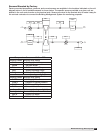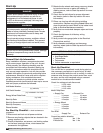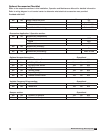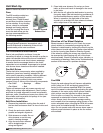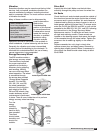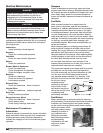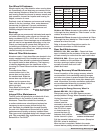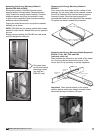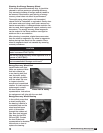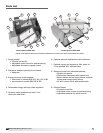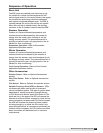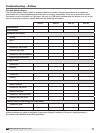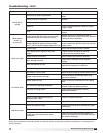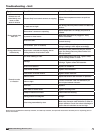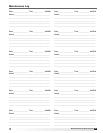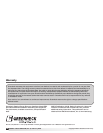
34
Model ERV Energy Recovery Unit
Troubleshooting – Unit
Always have a completed Pre Start-Up Checklist, unit Start-Up Checklist, and Optional Accessories Checklist prior to requesting parts or
service information.
Symptom Possible Cause Corrective Action
One or both
blowers turn off
intermittently and
back on after
about 2 minutes
Exhaust Only frost control sensors are tripping.
Adjust frost temperature sensor set point as
needed.
Energy wheel does
NOT turn
Air seals are too tight.
See Energy Recovery Wheel under Unit Start-Up
section.
“Economizer” sensors are operating.
Adjust temperature or enthalpy set points as
needed.
No power to wheel motor.
Make sure wheel drive is plugged in. Verify
power is available.
Wheel drive belt.
Check for loose or broken belts. Replace belts
(consult factory).
VFD overload. (OL1 on readout)
Refer to VFD section. Compare motor amp
rating to setting in VFD. Adjust accordingly.
Energy wheel runs
intermittently
Wheel motor overloads are tripping, due to
rubbing between wheel and air seals.
Recheck air seals, make sure they are not too
tight. See Energy Recovery Wheel under Unit
Start-Up Section.
Excessive noise
or vibration
Fan wheel rubbing on inlet.
Adjust wheel and/or inlet cone. Tighten wheel
hub or bearing collars on shaft.
Bearings.
Replace defective bearing(s). Lubricate
bearings. Tighten collars and fasteners.
Wheel out of balance. Replace or rebalance.
Loose wheel on shaft. Tighten wheel setscrew.
Loose motor or blower sheave. Tighten sheave setscrew.
Belts too loose. Adjust belt tension after 24 hours of operation.
Belts too tight.
Loosen to maintain a 3/8 inch deflection per
foot of span between sheaves.
Worn belt. Replace.
Motor base or blower loose. Tighten mounting bolts.
Buildup of material on wheel. Clean wheel and housing.
Bearing and drive misaligned. Realign.
Noise being transmitted by duct.
Make sure ductwork is supported properly.
Make sure ductwork metal thickness is sized for
proper stiffness. Check duct size at discharge to
ensure that air velocities are not too high.



